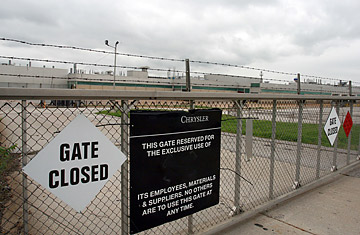
Chrysler's St. Louis South manufacturing facility sits idle.
The Chrysler bankruptcy makes a bankruptcy at GM harder because the American consumer may only be able to deal with the Chapter 11 of one of its auto companies, particularly the one that is the smallest of the three. But the consumer will almost certainly be forced psychologically, if GM fails as well, to purchase automobiles only from companies which are viewed as financially stable. That means that foreign car companies will have an even greater advantage than they do now. Chrysler lost 48% of its sales in April compared with the same month as last year. Domestic sales dropped 34% for the entire industry. It is probable that concerns about Chrysler's survival made potential customers anxious and contributed to its steeper decline. Many Americans are still do not understand how and why their warranties will be honored if a car company is bankrupt The government has made it clear that the warranties on Chrysler vehicles will be honored, but in the minds of its citizens the American government's word has not always been reliable.
So many individual investors hold GM shares either directly or through mutual funds that this will affect consumers who own a piece of GM. That was not an issue for Chrysler because it had no trading shares. The public had to watch GM struggle over the last two years to hold a price of $40, then $30, $20, $10, and finally just $2. The difference between Chrysler's demise and GM's is like the difference of a house burning down in the Wyoming wilderness versus a skyscraper on fire in Manhattan. Chrysler was never what GM was for many years — the largest company in America. (See the 50 worst cars of all time.)
There are other practical problems that make a government-imposed Chapter 11 on GM much more troublesome than Chrysler's. The most financially pressing of these are the country's auto parts suppliers. They are facing extended plant closings at all three of the car companies and the bankruptcy filing of Chrysler. Pushing GM into court and risking an extended fight could cut the flow of orders to suppliers by enough that it would ruin a large number of the businesses. These businesses supply the assembly lines of foreign and domestic car manufacturing facilities around the country. The suspension of building vehicles will actually help The Big Three reduce inventory, but that is a short-lived benefit that ends the moment the companies need to begin to begin production again.
The New York Times has pointed out the amount of money owed to creditors at GM, some $27 billion, is about four times the amount that Chrysler had to deal with. The paper writes "General Motors' creditors number in the tens of thousands and include pension funds that bought the company's unsecured bonds." Will a court have more pity for that multitude than it would the few large firms that were Chrysler's creditors? Probably not, if justice is blind. Still, GM's list of bondholders is long enough so it could slow the pace at which a judge would be able make his way through the thicket of their claims. (See Chrysler's Top 10 Moments.)
Much has been made of the fact that, as things are currently being planned by the Administration, the government will become the largest shareholder in GM and the UAW will be the largest shareholder in Chrysler. Why would taxpayers want to have a controlling interest in a large auto company along with the portfolio of investments that their elected officials have purchased for them at a number of big banks? The issue is a red herring. In the case of Chrysler and GM, federal money is going into the companies and has to be paid back if the restructuring of the American auto industry is going to be successful. Whether that is a debt repayment at Chrysler or an increase in the value of the equity in GM is hardly the issue. The issue is whether the restructurings work so that the companies can make money and deliver themselves from being wards of the state.
— Douglas A. McIntyre
See the 50 worst cars of all time.
For constant business updates, go to 24/7wallst.com.
